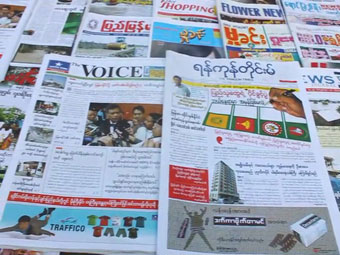Chiang Mai (Mizzima) – Burma may have a new government but their reform rhetoric continues to be contradicted by heavy censorship, according to a new report by the Committee to Protect Journalists (CPJ).
 In a lengthy report issued on Tuesday, the New York-based CPJ said banned topics are still wide-reaching and that, to date, the new government has not acted to abolish or amend the “highly arbitrary laws” that restrict press freedom and punish deviation from official dictates.
In a lengthy report issued on Tuesday, the New York-based CPJ said banned topics are still wide-reaching and that, to date, the new government has not acted to abolish or amend the “highly arbitrary laws” that restrict press freedom and punish deviation from official dictates.
As the CPJ points out, since elections in November 2010, two journalists have been sentenced to prison terms of almost 20 years, and more than a dozen publications have been suspended for their news reporting.
“The government’s promise of reform is welcome, yet censorship in Burma remains arbitrary, intensive, and highly restrictive,” said Shawn Crispin, CPJ’s senior Southeast Asia representative and the author of the report. “Legal reform to ensure press freedom would lend much-needed credibility to the government’s claims of democratic change in Burma. Draconian laws restricting reporting must be abolished, and imprisoned journalists must be immediately released.”
Crispin found in discussions with Burmese media organizations including the Democratic Voice of Burma, Mizzima and Irrawaddy that freedom of the press has yet to come to Burma, despite the rhetoric of President Thein Sein’s government.
The CPJ says that the veneer of press freedom evident in the proliferation of privately owned and operated news publications is shattered by the fact that the newspapers are heavily censored and regularly forced to publish state-prepared news and commentary presenting government policies in a glowing light.
“Uncensored reporting from within Burma is crucial for assessing whether the government’s promise of democratic reform is rhetoric or reality,” said Crispin. “Until new freedoms take hold, exile media continues to serve as a vital source of credible, independent information on developments within Burma and should not be abandoned by donor countries.”
Naypyitaw’s recent informal call for exiled dissidents to return to Burma was met with great skepticism by journalists interviewed by CPJ, precisely due to the lack of reforms.
Nearly all of the Burma-based reporters and editors interviewed for the CPJ report are said to have requested anonymity due to fears of possible reprisal if their names appeared in a report critical of the government.
According to the CPJ, two staff members and a freelance reporter working for their organization were denied visas to enter Burma to conduct research for the report. No reasons were given for the denials, it said.
In early September, Burmese Information and Culture Minister Kyaw Hsan told the Lower House of Parliament censorship of Burmese media is still needed and freedom should not be granted to newspapers and journals at this time.
An article in Mizzima in July, reported that Burmese censorship rules are now divided into two categories of newspapers and magazines: Group 1 includes 178 publications focusing on sports, health, arts, children’s literature, and technology, which don’t need to pass articles through censors prior to publication, but must submit copies after publication.
Group 2 includes 180 publications focusing on news, crimes, education, economics, and religion, which must pass articles through censors prior to publication.
An editor of a popular newspaper said, “We must act according to the circumstances.”
An editor told Mizzima that despite a modestly revised censorship policy, warnings to publications and suspensions means there is still censorship in Burma.
“Nothing has changed,” he said. “The only difference is that earlier they scrutinized the manuscripts and now they scrutinize the publications. That means they still have censorship.”


